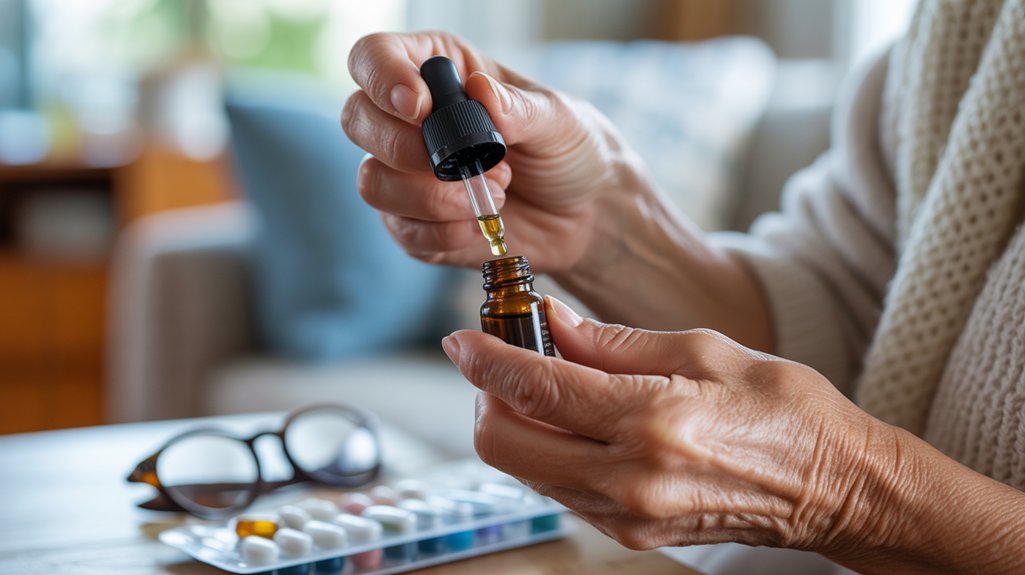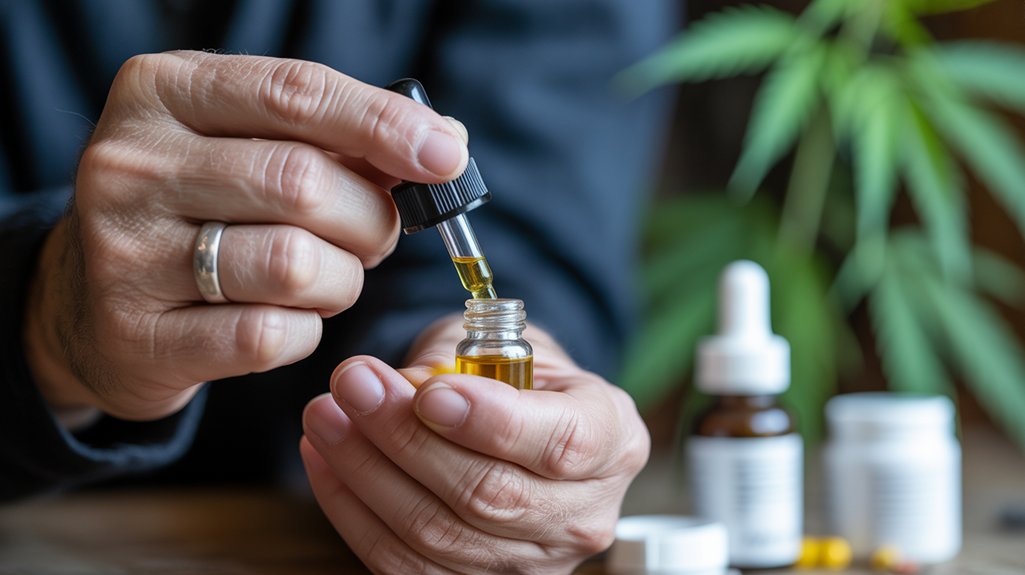Studies show that adults over 65 represent the fastest-growing demographic of cannabis users, with usage increasing by 75% between 2015 and 2018. If you’re considering delta-9 THC as a senior, you’ll need to understand how age-related physiological changes greatly alter how your body processes cannabinoids. Your diminished liver function, altered metabolism, and potential medication interactions create unique safety considerations that younger users don’t face, making informed decision-making absolutely critical.
Understanding Delta-9 THC and How It Affects Older Adults

Before exploring Delta-9 THC’s safety profile for seniors, you must understand that this psychoactive cannabinoid affects older adults differently than younger populations due to age-related physiological changes.
Your metabolism slows considerably with age, causing prolonged cannabinoid clearance and increased bioavailability. You’ll experience altered drug distribution patterns due to decreased lean body mass and increased adipose tissue, which affects THC storage and release.
Your hepatic function typically declines with aging, impacting Delta-9 THC metabolism through the cytochrome P450 system. The cognitive effects in seniors often manifest more intensely, including heightened confusion, memory impairment, and disorientation compared to younger users.
You’ll require careful dosage adjustments starting with minimal amounts—typically 1-2.5mg—due to increased sensitivity and potential drug interactions with medications you’re already taking.
Age-Related Changes That Impact Cannabis Processing
As you age, several physiological changes greatly alter how your body processes Delta-9 THC, creating unique considerations for cannabis use in older adults.
Your liver’s cytochrome P450 enzyme system, responsible for cannabinoid metabolism, becomes less efficient, potentially prolonging THC’s effects and increasing adverse reaction risks.
Decreased kidney function affects elimination rates, while reduced body water content and increased fat tissue alter drug distribution patterns.
These metabolic changes can intensify psychoactive effects unexpectedly.
Additionally, age related tolerance differs remarkably from younger populations—you may experience heightened sensitivity rather than decreased responsiveness.
Your cardiovascular system’s diminished capacity compounds these concerns, as THC can affect heart rate and blood pressure.
Understanding these physiological alterations helps inform safer dosing strategies.
Potential Health Benefits for Common Senior Health Issues
While physiological changes complicate Delta-9 processing in older adults, emerging research suggests potential therapeutic applications for several age-related conditions that commonly affect seniors.
Studies indicate Delta-9 may provide pain management benefits for chronic conditions like arthritis and neuropathy, though you’ll need lower doses due to increased sensitivity.
For anxiety relief, preliminary data shows modest improvements in generalized anxiety and sleep disturbances common in aging populations.
Research also suggests potential applications for appetite stimulation in seniors experiencing weight loss and nausea reduction related to medications.
However, you should note that most studies involve younger populations, and long-term safety data specifically for seniors remains limited.
Consultation with geriatric-informed healthcare providers is essential before considering Delta-9 therapy.
Drug Interactions and Prescription Medication Concerns
Drug interactions represent a significant safety concern for seniors considering Delta-9, particularly given that adults over 65 take an average of four prescription medications daily.
Delta-9 THC affects the cytochrome P450 enzyme system, which metabolizes numerous medications including blood thinners, anticonvulsants, and cardiovascular drugs.
You’ll face increased risks when combining Delta-9 with sedatives, as this can amplify drowsiness and cognitive impairment.
Prescription safety requires careful monitoring, especially with medications like warfarin, where THC may alter bleeding times.
You should consult your healthcare provider before using Delta-9, providing a complete list of current medications and supplements.
Drug interactions can unpredictably alter medication effectiveness or increase adverse effects in seniors.
Recommended Dosing Guidelines for Older Adults

Given the heightened sensitivity of aging physiology, dosing recommendations for seniors differ substantially from standard adult guidelines. You’ll need significant dosage adjustments when initiating Delta-9 THC therapy. Start with 1-2.5mg doses, considerably lower than typical adult recommendations of 5-10mg.
Your metabolism processes cannabinoids more slowly, requiring extended intervals between doses—wait 4-6 hours before considering additional consumption.
Potency considerations become critical as you age. Your endocannabinoid system exhibits altered receptor sensitivity, making you more susceptible to adverse effects like cognitive impairment and orthostatic hypotension.
Titrate dosages incrementally by 1mg every 3-5 days while monitoring therapeutic response and side effects. You shouldn’t exceed 5mg daily without medical supervision.
Consider micro-dosing protocols starting at 0.5mg to establish individual tolerance thresholds safely.
Side Effects and Safety Risks to Consider
Because seniors experience heightened vulnerability to Delta-9 THC’s psychoactive effects, you’ll face increased risks of cognitive disruption, including short-term memory impairment, confusion, and disorientation that can persist for 6-8 hours post-consumption.
Short term effects require immediate monitoring:
- Orthostatic hypotension increasing fall risk and fracture potential
- Respiratory depression, particularly concerning with existing pulmonary conditions
- Cardiac arrhythmias and blood pressure fluctuations
- Anxiety, paranoia, and panic episodes
- Impaired motor coordination and reaction times
Long term effects present additional concerns.
Chronic use may exacerbate cognitive decline, interfere with prescription medications through hepatic enzyme interactions, and develop tolerance requiring higher doses.
You’re at elevated risk for drug interactions, especially with anticoagulants, sedatives, and cardiovascular medications.
Pre-existing conditions like dementia, heart disease, or psychiatric disorders contraindicate Delta-9 use without physician consultation.
Medical Supervision and Healthcare Provider Guidance
Before initiating Delta-9 THC therapy, you must obtain thorough medical evaluation from a healthcare provider experienced in cannabinoid medicine. Your physician will assess current medications, comorbidities, and contraindications that may complicate THC use.
Medical oversight becomes critical given seniors’ increased vulnerability to adverse drug interactions and altered metabolism. Healthcare collaboration guarantees proper dosing protocols and monitoring schedules.
Your provider should establish baseline assessments, including cognitive function and cardiovascular status. They’ll monitor therapeutic response while watching for concerning symptoms like cognitive impairment or cardiovascular changes.
Don’t attempt self-medication without professional guidance. Your healthcare team can adjust dosages based on your individual response and emerging side effects.
Regular follow-up appointments allow for treatment optimization and early detection of complications, guaranteeing safer therapeutic outcomes.
Legal Considerations and Product Quality Standards
Beyond securing proper medical supervision, you must navigate the complex legal frameworks surrounding Delta-9 THC products. State regulations vary markedly, affecting availability, potency limits, and purchasing requirements for seniors. Your product sourcing decisions directly impact safety outcomes.
Consider these critical quality standards when evaluating Delta-9 products:
- Third-party laboratory testing for potency, pesticides, and contaminants
- Certificate of Analysis (COA) documentation from accredited facilities
- Good Manufacturing Practices (GMP) certification from licensed producers
- Child-resistant packaging with clear dosage labeling and ingredient lists
- Batch tracking systems enabling product recalls if safety issues arise
You’ll need to verify your state’s specific legal requirements before purchasing. Licensed dispensaries typically maintain higher quality standards than unregulated sources, reducing contamination risks and ensuring accurate dosing information essential for senior safety protocols.
Alternative Cannabis Options for Seniors

Several cannabinoid alternatives to Delta-9 THC offer distinct therapeutic profiles that may better suit senior patients’ specific health needs and tolerance levels. CBD provides anti-inflammatory and anxiolytic effects without psychoactive properties, making it ideal for pain management and sleep disorders.
CBG demonstrates potential neuroprotective qualities and may help with glaucoma symptoms. Delta-8 THC delivers milder psychoactive effects than Delta-9, reducing anxiety while maintaining analgesic benefits.
You’ll find various cannabis delivery methods optimize these alternative cannabinoids’ bioavailability and onset times. Sublingual tinctures provide precise dosing and faster absorption, while topical formulations target localized inflammation without systemic effects.
Transdermal patches offer sustained release over extended periods. These alternative cannabinoids often present fewer contraindications with common senior medications, though you should always consult healthcare providers before incorporating any cannabis-based therapies into existing treatment regimens.
Conclusion
You’re steering through uncharted waters when considering delta-9 THC as a senior. While this cannabinoid can serve as a therapeutic anchor for pain management and appetite stimulation, you’ll need careful medical supervision to avoid stormy seas of drug interactions and heightened sensitivity. Start with minimal doses (1-2.5mg) and maintain extended dosing intervals. Your healthcare provider must chart this course with you, ensuring you’re sailing safely through evidence-based treatment protocols rather than drifting into potentially dangerous therapeutic territory.





